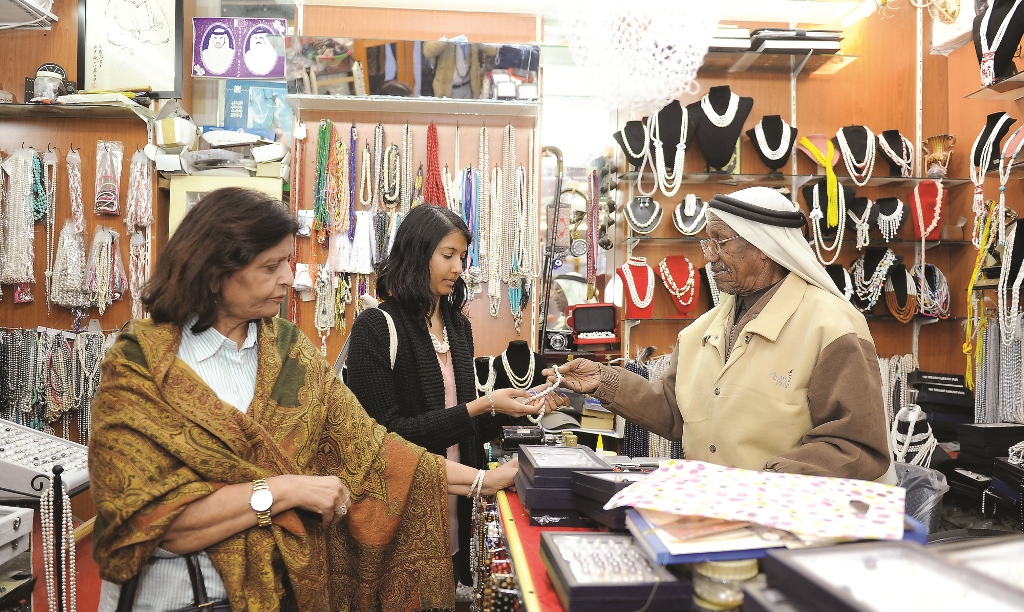
As we walked on the alleys of Souq Waqif in search of shops selling pearls, met with the veteran - probably the only surviving pearl diver in Qatar.
Saad Ismail Al Jassem, a multifaceted Qatari, who has a fascinating story to tell. He talked to The Peninsula about his life as a diver, a bodybuilder, an entertainer and a poet.
Saad is fluent in Arabic, English, Italian and Hindi, recalls the good old early days of pearling fondly.
At the age of 18, Saad became a diver, mastered the art of pearl diving and turned into a ‘Tawash’ – expert in the pearl trade.
During the olden days, only equipment divers like Saad used to find pearls were a nose clip, a net, which he put around his neck to place pearls in, and a weight that was tied around the diver’s foot to stop him from floating.
“In old days, before oil discovery, there was no way of income except, we go to the desert, cut wood, cook on it or sell, or cut grass and give it to the animals and during the summer of course we go to the sea. We go in a big boat with the captain, helper of the captain, the diver and helper of the diver,” said Saad.
“The diver wear three things for diving, weight put on his feet to take the diver down, second is a basket to collect the oyster and third is the nose clip to put on the nose to avoid water going into the nose.

“Divers will take a long breath and go into the sea- to the bottom of the sea. The diver stays inside water for two minutes without breathing. Then he will give a signal to the helper and the helper will pull and bring him up, then the diver will put the oyster in to the basket and from the basket to the boat. Then he will dive again,” said Saad.
While, talking to us he took out an old nose clip from his pocket, and demonstrated how he would wear it. Also a basket in which they used to collect the oysters is still hanging on the roof of his shop.
In the past divers go pearl fishing from south to the north of the Qatari waters, between 50 to 80 miles.
“We go diving daily from sun rise to sun set, our journey takes about three to four months in the sea. We eat, drink and sleep in the boat,” said Saad.
In the ancient days traders came to Qatar from India, France and Italy looking for pearls.
“The Souq Waqif was not like this before, the sea was near to the shops. Traders come in small and big boats from different countries and they buy pearls from us,” said Saad.
Asked how often would he find pearls in oysters, Saad took a pause and said, “It all depends on the Rizq – blessings of Allah.”
However, now things have changed, but Saad’s shop is filled with countless colourful pearls – the modern day fresh water pearls. He is more a story teller of the tradition and culture of ancient Qatar, he refrains from telling customers rosy stories about the pearls he sells or do not try to somehow do business. In other words he is very straight forward, just explain customers about the nature and price of the pearls and let them free to make a decision.
Cultured freshwater pearls are pearls that are farmed and created using freshwater mussels. These pearls are produced in Japan and the United States on a limited scale, but are now almost exclusively produced in China.
A string of fresh water pearls would cost between QR100 to QR1000 depending on their nature.
“Now we import fresh water pearls from India, Japan, Sri Lanka and China. But these days China is the fresh water pearl hub,” says Saad.
His shop holds a name board ‘Phalwan Saad Ismail Al Jassim :The Old pearl diver.’ ‘Pahlwan,’ an Arabic word referring to Saad’s admiration for body building and public performances. Bodybuilding photographs in various poses pasted near the front door and wall of the shop prove his long-term commitment to fitness.
Saad is nearly 80 years old and still continue to practice his ability to rest on nails.
He also showed a video and photographs of him lying on a bed of glass, holding a board with stacked boulders, as another man whacks at them with a sledgehammer.
Saad upholds a passion for living and wants to continue diving and body building as long as he can.




